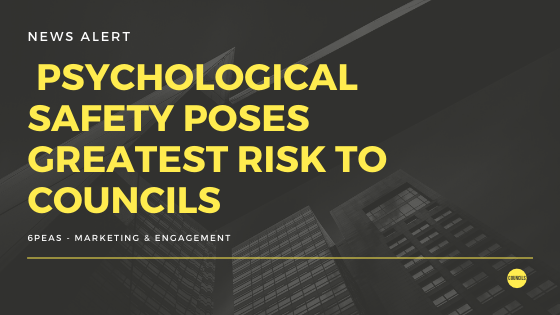Recent reports into Australian Local Government Workforce and Future Skills and digital transformation have identified a greater risk to councils than a labour skills shortage. Recent reports into Australian local government digital transformation and workforce challenges have highlighted key elements that underpin psychologically unsafe work environments.
The Australian Local Government Workforce and Future Skills Report September 2018 conducted by the Australian Local Government Association, published key findings into the local government workforce, and identified underlying issues which are strong indicators of psychologically unsafe workplaces and highlight the bigger concern for councils with regards to workforce challenges than a skills shortage across councils.
The biggest risk to councils is adverse action and other negative outcomes, in relation to psychological safety in the workplace.
Issues putting councils at high risk of negative outcomes from across all operations including legal, financial, human resources and marketing include:
- Unmet training needs due to transformation
- Poor management
- The need for soft skills training
- The need for people with soft skills in management
- Poor leadership
- Lack of people in critical roles
Carolyn Grant, managing director of 6peas marketing and engagement says, “based on the published skillsforce and transformation reports into local government, psychological safety should be the number one concern with councils”.
Psychological safety is defined as “feeling able to show and employ one’s self without fear of negative consequences to self image, status or career”. Psychological safety promotes work engagement, shapes how people feel and perform in their roles and is necessary for individuals to feel secure and capable of changing their behaviour”, says Ms Grant.
“If Councils take action they can turn many of the risks and challenges into rewards. We need to start thinking differently, we cannot continue to solve problems the same way they were created”.
The rewards for a psychological safe workplace are many and impact the whole of local government: high productivity, innovation, attracting and retaining the best employees, better returns on transformation projects, high customer satisfaction and reduced workplace health and safety claims and costs.
So why should this matter to councils?
Impact:
Psychological safety does not just impact one department or unit. It impacts on the whole organisation. This is one metric we need to be measuring for the benefit of all departments across councils – finance, legal, WHS, marketing, HR, People and Performance, Works, Corporate Services.
Costs:
We know that one in four people in Australia will experience a mental health issue in their lifetime. Simply, employers who do not support the mental health of their workforce risk losing not only valuable talent, but also an estimated $14 billion every year from absenteeism, lost productivity, impeded business growth and compensation claims.
Skilled staff:
The recent scandals across all State local government in Queensland, Perth and Adelaide and New South Wales have meant it will be harder to attract and retain the right talent. Integrity and trust has been eroded and there is a perception of negativity and high conflict within local governments – these are not environments people wish to work which leads to employee turnover, low productivity, and an inability to attract great talent.
Skills shortages have been identified as a key issue for local governments, however Ms Grant believes that it goes deeper than that, “psychological safety is linked to productivity, employee turnover, customer satisfaction, absenteeism, workplace health and safety claims, attracting and retaining the right talent and leadership capability. If you can measure and monitor psychological safety and take the right interventions, you will develop a workplace that will attract and retain the people with the right skillsets.
Transformation:
Improving customer experience, digitalisation and modernising technology are the prime areas for transformation in local government. “Transformation encompasses new ways of working and thinking, not just technology. Without psychological safety our staff are reluctant to learn and change behaviours. So we are spending millions of dollars on transformation projects that are likely to fail or under deliver.
Customer experience:
Council ‘customers’ are used to obtaining information, goods and services at the click of a button. They increasingly compare and expect the same personalised experience from their interaction with councils, that they get from other public and private sector providers. “Customer rage is becoming more common as the interactions that require a personalised touch are being diverted to substandard technological solutions and our frontline staff poorly trained and equipped to deal with difficult conversations that require soft skills”, says Ms Grant.
Reputational damage:
The recent scandals and inquiries have highlighted the level of psychologically unsafe workplaces with many workers interviewed concerned more about their personal welfare than the implications of the inquiries themselves. This impacts on investment into the region and also the ability to attract and retain personnel. When councils are in the front page of the newspapers with allegations of being “broken, disfunctional, aggressive or putting staff under significant and prolonged pressure” this is a psychological safety issue.
Legal implications:
Whilst councils might be liable for breaches of the Workplace Health and Safety regulations, individuals in leadership roles may also be liable. Individual employees need to discharge their duty of care and wider obligations under the workplace health and safety laws. There are penalties that can be imposed against officers (such as HR and leaders) for failing to exercise due diligence when responding to incidences in the workplace in a timely manner.
What can Councils do?
Councils can take action to ensure that psychological safety is a priority.
1. Assess & measure:
Ensure that psychological safety at a team level (not individual level) is being assessed across the organisation. This is not an employee engagement assessment, nor is it a cultural survey. This is an assessment into team psychological safety and the influence of leadership on those teams.
2. Identify
Identify high risk teams within the organisation as a priority. Identify gaps in leadership and in team assessment scores, skills gaps and competency gaps.
3.Tailored solutions
Tailor solutions to each of the teams with the needs identified in your assessment tool. Including the identification of what level of support is required, what behaviours and norms do we need to change and how long until we have sustained change. A one size fits all approach does not work and will not result in long lasting change.
4.Prioritise
Prioritise action with high risk teams and leaders by providing the skills, tools and training to allow people to thrive in the workplace at all levels.
5.Train
Train management and staff on emotional, social and attentional intelligence. Give our leaders the skills they need to manage people and create safe and productive work places.
6.Monitor
Continue to monitor and measure psychological safety. Management has 70% influence on team performance, and as such one person can change the whole environment of a team.
With the completion of the Royal Commission into the banking, finance and superannuation industries and the call for due diligence around non -financial metrics such as customer and culture – now is the time to put focus on the things that matter – people.
About: Carolyn Grant is the managing director of 6peas marketing and engagement – with a focus on people as the key to driving performance. 6peas has developed a Psychological Safety program as the foundation to customer, digital or cultural transformation

